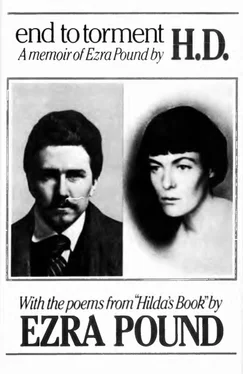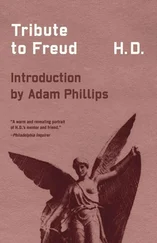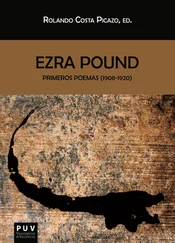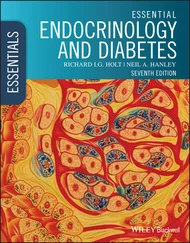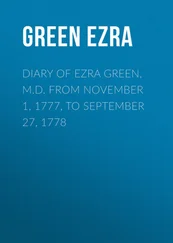After that we did not see much of Ezra and the Kensington group, Olivia Shakespear (Dorothy’s mother), Violet Hunt, Ford Madox Hueffer (as he then was) and the rest of them. The 1914 war had begun. Richard and I were married in October 1913 after what Ezra called our “unofficial honeymoon in Italy.”
I saw Ezra, on the way back from Capri-Naples, in Venice that year.
He must show me a church. We darted in and out of alleys or calles , across bridges, narrow passageways, the labyrinth. He was “tracing / the lay-out for the Labyrinth,” from the Ramon Guthrie poem 6[on Pound, in the same issue of The Nation ]. It was very hot — May, I think. The church was cool, with a balcony of icy mermaids, Santa Maria dei Miracoli. Years afterwards, I went again and I carried the votive card of Santa Maria that the sacristan had given me, in my handbag, with another (St. Mark’s) token picture, during the [World] War II years in London. Ezra was in Rapallo, as we all know.
When I came here to Küsnacht, May 1946, after the war, I cleared out the grubby contents of my bag. Why did I tear up the pictures? Well, they were frayed and old, as I was, and I must find new talismans. I found them in my writing. I wrote feverishly, but the real content of my Ezra story was not touched on or only brushed in lightly.
Mr. Morley, one of the guests here, asked me if I knew Gaudier-Brzeska 7—or he said, a Polish sculptor in London who was killed in the first war. How did we come to talk at all? I have coffee downstairs in the dining room, the days that Dr. Heydt doesn’t come in. I had never mentioned Ezra, except to Heydt and Joan — now some door opens. Mr. Morley knew about him.
Mr. Morley is a tall, depressed American abstract artist, with a pleasant voice. He talked of Joyce, Yeats, Eliot. All this world, these people, come into consciousness. Today, he brings me a picture. “You must keep it,” he said. It is a blue animal, lion, padding behind symbolic bars that might be trees. It is “The Poet in the Iron Cage” (“Der Dichter irn Eisernen Käfig”) . The design is hypnotizing. Joan said that she would fasten up the picture for me and came upstairs to find a place for it.
I am anonymous here or try to be. But talking and thinking of Ezra creates a human, humanizing bond. But this has only happened lately; I mean this simple, natural approach has come to me since reading and re-reading the “Weekend.”
March 9
Joan looked and looked at the picture when we had our usual, ritual glass of Chianti before dinner. She had tacked it on the wall above the Lausanne bookcases that Bryher had had sent over for me. I see the lion from my bed as I write here, after breakfast. Joan said, “It looks like a water buffalo.” She said, “There are birds — now, I see another bird.” I don’t see the lion’s head from here, this might be a Minotaur. He seems to burst out of his cage. It is again, “stalking, pacing / as done by jaguar or ounce / in Zagreus’ days,” from the Guthrie poem.
The bars are trees now. Will the lion devour me or redeem me — or both?
They say I must go into Zürich for another X-ray. This terrifies me. This is the terror one can not speak of, that walkelh by night . They might ask me to stay in the Klinik 8again. It is the fear of being caught, caged, confined — a confinement . I had sixteen weeks there, in the Klinik Hirslanden, last winter. But I can walk around the house now. It is too bitter cold to go out, anyway.…
I did not see him at the time of my first confinement, 1915. I lost that child. The second was four years later, 1919. He hurtles himself into the decorous St. Faith’s Nursing Home, in Ealing, near London. Beard, black soft hat, ebony stick — something unbelievably operatic — directoire overcoat, Verdi. He stalked and stamped the length of the room. He coughed, choked or laughed, “You look like old Mrs. Grumpy” (or some such) “in Wyncote.” Wyncote was where the Pounds had lived, outside Philadelphia. True, I wore a becoming (I thought) black lace cap. Naturally, I looked no sylph. He seemed to beat with the ebony stick like a baton. I can’t remember. Then, there is a sense of his pounding, pounding ( Pounding) with the stick against the wall. He had banged that way, with a stick once before, in a taxi, at a grave crisis in my life. This was a grave crisis in my life. It was happening here. “But,” he said, “my only real criticism is that this is not my child.”
I wondered who had let him in. I did not know he was coming. From me, screams were inhibited, prohibitive. Did I want to scream? I was sorry that my appearance shocked him. The next day at noon, March 31, 1919, the child was born.
The first time, in the taxi, was before I was married. Frances Gregg 9had filled the gap in my Philadelphia life after Ezra was gone, after our “engagement” was broken. Maybe the loss of Ezra left a vacuum; anyway, Frances filled it like a blue flame. I made my first trip to Europe with her and her mother, summer 1911. Frances wrote, about a year after her return to America, that she was getting married (“When this letter reaches you, I shall be married.”) She said that one of the objects of her marriage to this English University Extension lecturer — or in fact the chief object — was a return to Europe so that she could join me; we would all go to Belgium together where “Louis” was lecturing.
I found Ezra waiting for me on the pavement outside the house, off Oxford Circus, where I had a room. His appearance was again unexpected, unpredictable. He began, “I as your nearest male relation” and hailed a taxi. He pushed me in. He banged with his stick, pounding ( Pounding ), as I have said. “You are not going with them.” I had seen them the day before at their hotel, off Victoria Station. It was all arranged. Ezra must have seen them afterwards. “There is a vague chance that the Egg,” (he called her), “may be happy. You will spoil everything.” Awkwardly, at Victoria Station, I explained to a married Frances, with a long tulle travelling veil, that I wasn’t coming. I had changed my mind. Awkwardly, the husband handed me back the cheque that I had made out for my ticket. Glowering and savage, Ezra waited till the train pulled out.
March 10
It was Richard Aldington 10from Sury-en-Vaux, France, who sent me the “Weekend” article. I returned it, then asked to have it back again. I wanted Erich Heydt to read it, and Bryher, 11and George Plank who was here for a few days. I had said to George, “It was the first time that I laughed about Ezra, for — how many years? It was the jamjar or peanut-butter jar with tea.” I got the article again, posted it to George in Sussex, he returned it, Joan read it. Bryher read it. Erich read it. We all felt that Ezra’s surroundings were deplorable. So I talked about Ezra. Again I wrote Richard in France, asking if I should return the “Weekend.” He wrote back, “Do by all means keep the Rattray article on Ezra. It is such a welcome change to have him reported as a human being, and not as journalist’s abstraction or political ‘cause.’ ”
There is a human Ezra flinging books from a table in May Sinclair’s 12studio on to an inaccessible shelf that ran under the high sloping roof. “People impose on you,” he said, “you can’t get those books down. You can’t write letters to all those people.” He explained to us afterwards, “It’s her Divine Fire . You read it?” This was a swarm of minnows, according to Ezra, poets in the manner of the underprivileged hero of The Divine Fire . I had read the novel in America, before I left with Frances and her mother. I had never expected to meet any of these famous people. The strange thing is that Ezra was so inexpressibly kind to anyone who he felt had the faintest spark of submerged talent. I still think of those books, slim volumes of verse, first books I should imagine for the most part. No doubt Miss Sinclair summoned a janitor, a window-cleaner or a fireman with an imposing ladder. She wouldn’t, with her amazing Edwardian courtesy, neglect her minnows.
Читать дальше
